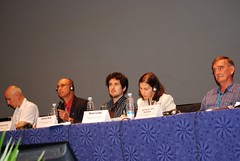 8 July 2008 - 09:00
8 July 2008 - 09:00Session 3: Adapting to the climate crisis
The running theme of the Reunion 2008 conference so far has been the call for increased networking and cooperation amongst the ORs and OCTs. In order to facilitate this 'common language', experts at the IUCN researched and produced the background publication - 'Climate Change and Biodiversity in the EU Overseas Territories'.
Jérôme Petit, IUCN research officer and one of the lead authors of the publication, indicated the importance of this document as the first comparative study of the 28 EU overseas entities.
“One of first aims was to establish the notion of overseas entities and make people aware of the ecosystems which exist in these territories,” stated Petit, adding that, “it illustrates responses to climate change – positive examples that can be applied to other regions such as the artificial reefs in the Caymans that can reproduce reefs after coral bleaching.”
Petit indicated that climate change was already having a strong impact on the ORs and OCTs, contradicting the common notion of climate change effects being a futuristic phenomenon.
“Ice caps melting and corals being bleached... sea turtle reproduction being threatened through beach erosion... phytoplankton - the beginning of the ocean food chain - diminishing in parts of the pacific,” outlined Petit.
Overseas Entities pointing the way forward in adaptation
“The Overseas Entities are good indicators for the effects of climate change, and can be used as an alarm network, as they will be the first that will have to adapt,” said Petit, adding that it required the mobilisation of the EU and private bodies to help turn the islands into pools of excellence for studying climate change and adaptation.
José Ignacio Gafo Fernandez, advisor on climate change to the Canary Islands, echoed these sentiments, recommending the next step to “use ORs as laboratories to experiment with European technology and know-how.”
The EU funded research programs (such as ADAM and PESETA) tended to leave out the ORs for geographical reasons, according to Fernandez, highlighting a need for a specific research sub group for the ORs.
“We have to deepen impact analysis and legislation so it is line with what we have to deal with. Why not use article 219 and extend it to ORs?” asked Fernandez.
He ended by stating that there was “much talk and more action, so why not seek for more action and less talk?”
Putting words into positive action to reduce both CO2 and GGEs in the Caribbean has proven very effective, according to Carlos Fuller, deputy director, CCCCC, through the installation of tide gauges, sea level measurement equipment and water quality measurement equipment.
Expanding networks
To enhance the impact of effective adaptation, increased cooperation was essential, according to Fuller, “We should widen networks to ensure that we are all sharing information and not duplicating projects, as well as utilising limited resources. All countries must speak the same language of climate change.”
Expansion of the network has now incorporated the British Overseas Territories (BOTs) into the scheme, and Fuller recommended that other territories could benefit from similar projects.
The pooling of information and resources has been at the heart of projects instigated by the UNFCCC, explained Rocio Lichte, programme officer, adaptation, technology and science programme, UNFCCC.
She outlined the 'Nairobi Work Programme' – a global adaptation framework based on a sound, technical and socio economic basis that is comprised of many international NGOs and private representatives. According to Lichte, it helps officials make informed decisions to take action on climate change, and is a part of the Bali Action Plan (BAP).
The Bali Action Plan (BAP) seeks to integrate all the established UNFCCC packages, and to work towards a framework for a two year negotiation process to strengthen the international response to climate change, 'Now, up to and beyond 2012'.


No comments:
Post a Comment